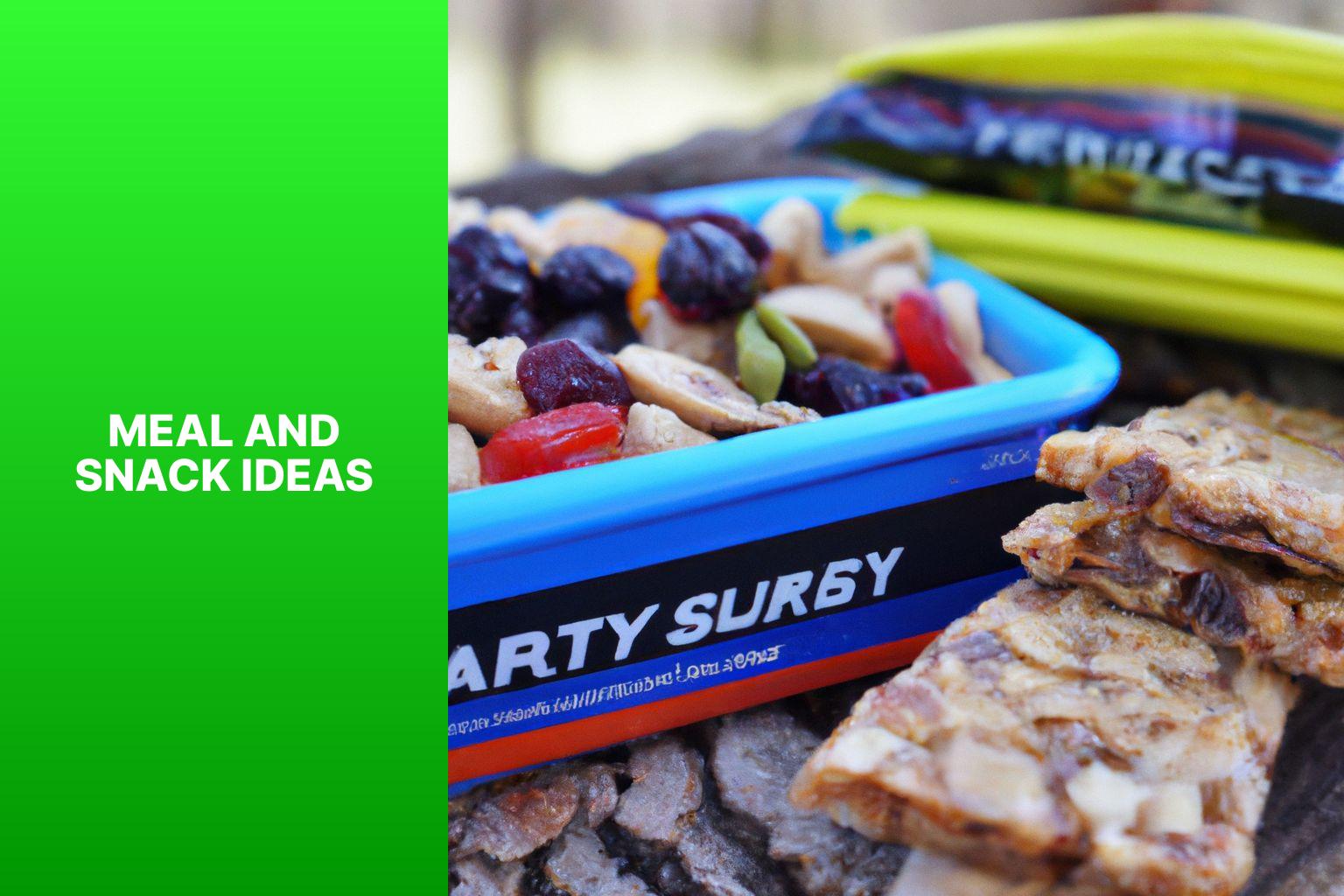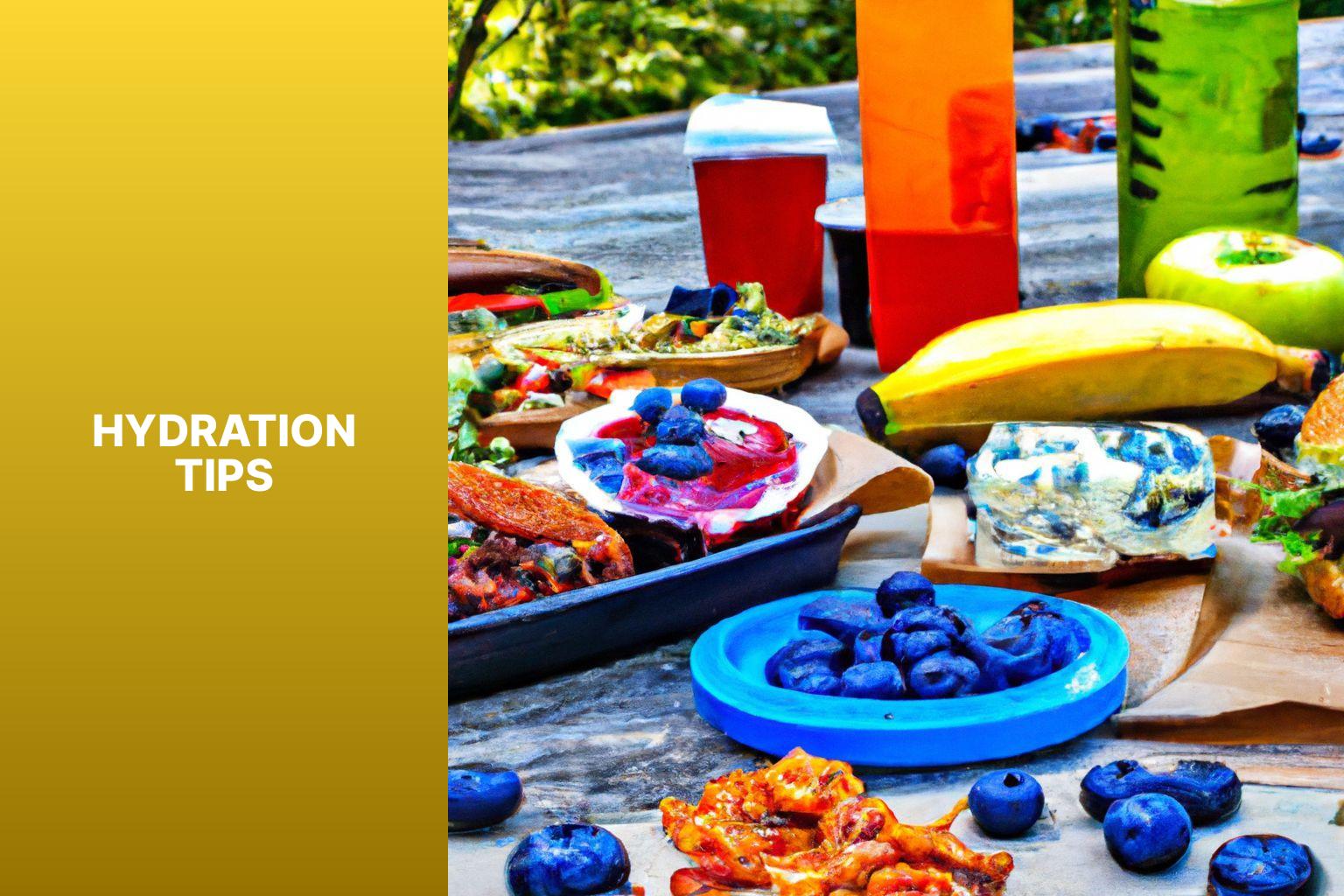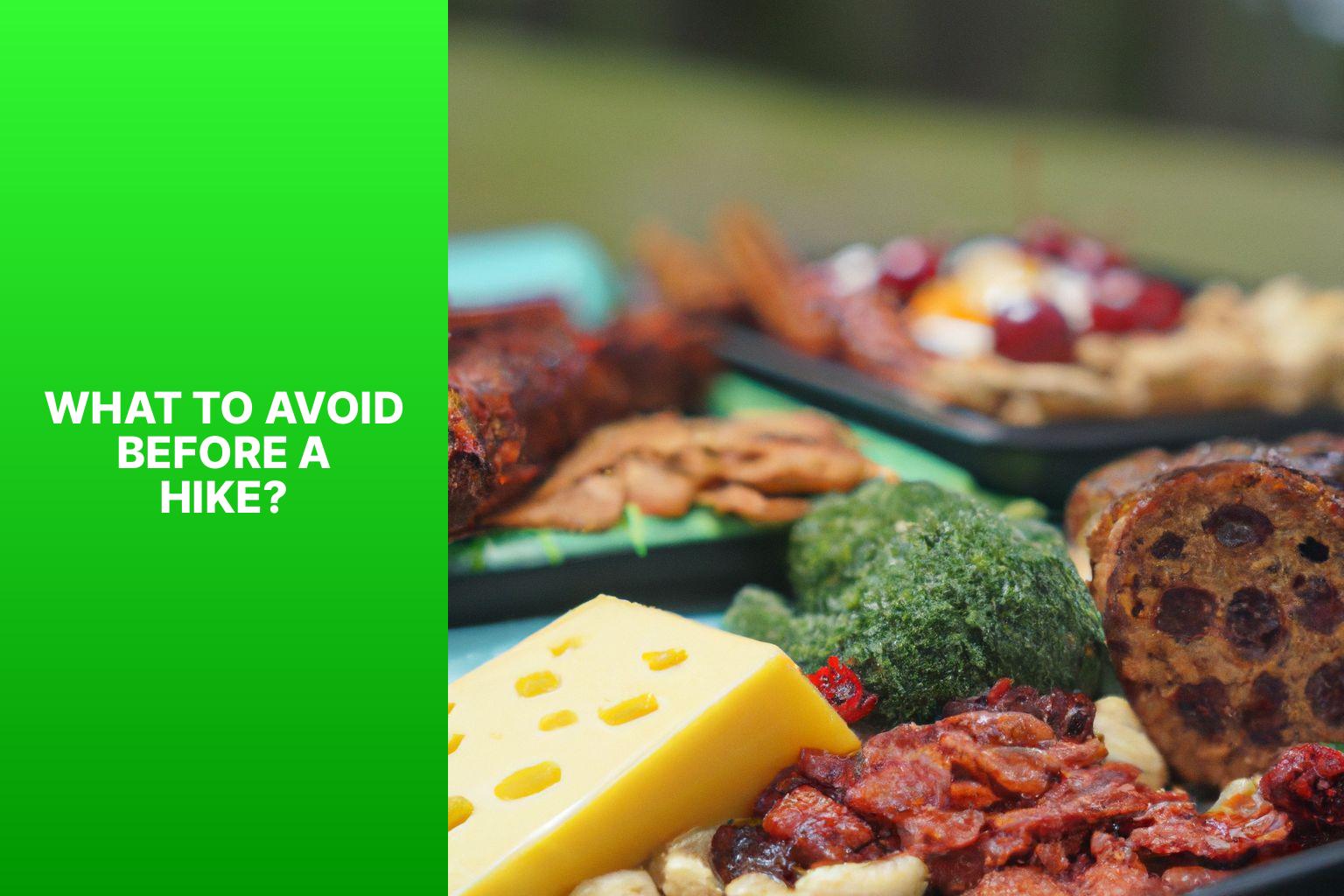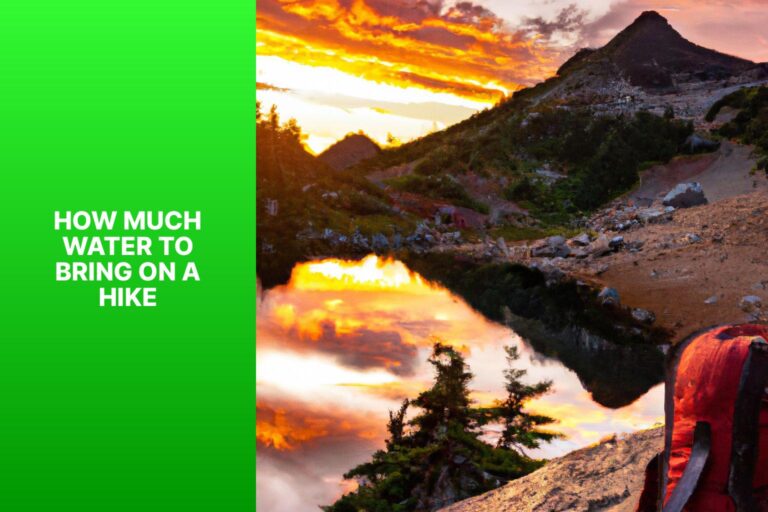What to Eat Before a Hike
Pre-hike nutrition plays a crucial role in fueling your body and preparing it for the physical demands of hiking. The right combination of nutrients can provide you with the energy, endurance, and hydration needed to tackle the trails effectively. Focusing on the importance of pre-hike nutrition, this article explores key nutrients, meal ideas, hydration tips, and what to avoid before a hike.
Ensuring proper nutrition before a hike is vital as it provides your body with the fuel it needs to perform optimally. Key nutrients for hiking include carbohydrates, proteins, fats, and hydration. Carbohydrates are the primary source of energy for your muscles, proteins help repair and build muscle tissue, while fats provide sustained energy. Hydration is also crucial to prevent dehydration and maintain bodily functions.
To maximize your hiking performance, it is essential to consume a balanced carb-protein meal before your hike. This meal should provide a good mix of energy from carbohydrates and muscle-repairing properties from proteins. An energizing breakfast with complex carbohydrates and a moderate amount of protein is ideal to sustain energy levels. packing snacks that provide sustained energy, such as granola bars or trail mix, can be beneficial during longer hikes.
For meal and snack ideas, consider a pre-hike morning meal consisting of oatmeal topped with fruits and nuts, or whole-grain toast with eggs and avocado. Pre-hike snacks may include yogurt with berries, nut butter with apple slices, or energy bars with a mix of nuts and dried fruits.
Proper hydration is crucial before a hike to ensure optimal performance and prevent dehydration. Drink an adequate amount of water before your hike to hydrate your body. Consider consuming sports drinks or electrolyte supplements if you anticipate a particularly strenuous or lengthy hike to replenish electrolytes.
It is important to be aware of what to avoid before a hike. Stay away from heavy, greasy foods that can cause digestive discomfort and sluggishness. Avoid sugary snacks that may lead to energy crashes. limit caffeine and alcohol intake as they can dehydrate your body.
By prioritizing pre-hike nutrition, you can enhance your endurance, maintain energy levels, and have a more enjoyable hiking experience.
Key takeaway:
- Pre-hike nutrition is crucial: Proper nutrition before a hike is important to fuel your body and optimize performance.
- Key nutrients for hiking: Carbohydrates, proteins, fats, and hydration are essential for energy, muscle repair, and sustained stamina during a hike.
- Recommended pre-hike meals and snacks: A balanced carb-protein meal, energizing breakfast, and snacks that provide sustained energy can help prepare your body for a hike.
Why is Pre-Hike Nutrition Important?

Photo Credits: Jasonexplorer.Com by Mason Jackson
Pre-hike nutrition is essential for multiple reasons. So, why is pre-hike nutrition important? Well, consuming the appropriate foods before embarking on a hike effectively fuels your body for the physical activity ahead.
It is crucial to have a well-balanced meal that consists of carbohydrates, protein, and healthy fats. This combination replenishes glycogen stores in the muscles, ultimately providing the necessary energy for prolonged exertion.
Pre-hike nutrition plays a key role in preventing fatigue and improving endurance. By ensuring you consume adequate calories and nutrients, you optimize your performance and maintain stamina throughout the entire hike.
Proper pre-hike nutrition also aids in muscle recovery and repair. Including protein-rich foods such as lean meats, fish, or plant-based alternatives supports muscle growth and helps repair any damage that may occur during the hike.
In addition to muscle recovery, pre-hike nutrition assists in hydration. Foods with a high water content, such as fruits and vegetables, are particularly beneficial in hydrating the body before engaging in physical activity. Adequate hydration is vital to ensure optimal bodily functions and prevent dehydration.
Nutrition before a hike contributes to overall well-being and reduces the risk of injury. A well-nourished body handles physical stress better and recovers more effectively from strenuous activity. It bolsters immune function, allowing you to enjoy the hike without interruption from illness.
What are the Key Nutrients for Hiking?

Photo Credits: Jasonexplorer.Com by Peter Smith
Fueling your body with the right nutrients is essential for a successful hike. In this section, we’ll uncover the key nutrients you need to pack in your backpack. From energy-boosting carbohydrates to muscle-repairing proteins and essential fats, we’ll explore how each nutrient contributes to your hiking performance. And of course, we can’t forget about hydration, as we delve into the importance of staying adequately hydrated on the trails. Lace up your hiking boots and get ready to discover the secret to fueling your adventure!
Carbohydrates
Carbohydrates are a vital nutrient for hikers as they provide the primary source of energy for muscles during physical activity. They can be classified into two categories: simple and complex. Simple carbohydrates, also known as sugars, are quickly absorbed by the body and provide a rapid burst of energy. Examples include fruits, fruit juices, and sports drinks. On the other hand, complex carbohydrates are digested more slowly and provide sustained energy over a longer period of time. They are found in foods such as whole grains, potatoes, and legumes.
To ensure optimal energy levels before a hike, it is important to consume a balance of both simple and complex carbohydrates. Approximately 50-60% of your pre-hike meal or snack should consist of carbohydrates. Avoid excessive amounts of sugary foods as they may cause sudden energy spikes followed by crashes. Choose carbohydrates that are rich in fiber, vitamins, and minerals to support overall health and well-being. Staying hydrated before, during, and after your hike will optimize the effectiveness of carbohydrates in providing energy.
Proteins
Proteins are essential for hiking as they repair and build muscles, preventing fatigue and increasing endurance. Key considerations about proteins include:
– Protein sources: Include lean sources like chicken, turkey, fish, tofu, beans, and lentils in pre-hike meals.
– Adequate protein intake: Consume 20-30 grams of protein in your pre-hike meal or snack for muscle repair and maintenance.
– Protein-carbohydrate balance: Balance carbohydrates and proteins in pre-hike meals. Carbohydrates provide energy, while proteins aid in muscle recovery and growth.
– Time of consumption: Eat protein-rich foods 2-3 hours before the hike for proper digestion and nutrient absorption.
– Protein snacks: Bring protein-rich snacks like nuts, beef jerky, protein bars, or Greek yogurt for sustained energy during the hike.
– Post-hike protein intake: After the hike, have a protein-rich meal or snack like lean meat, eggs, or a protein shake to aid muscle repair and recovery.
By considering these factors, you can incorporate enough proteins into your pre-hike nutrition to support your muscles and improve your performance on the trail.
Fats
Fats are necessary for hiking as they provide energy, maintain body temperature, and aid in vitamin absorption and hormone production. Choose healthy fats for pre-hike nutrition to maximize benefits.
Here is a table of healthy fat sources for hikers:
| Fat Source | Benefits |
|---|---|
| Avocado | Provides heart-healthy monounsaturated fats. |
| Nuts and Seeds | Rich in omega-3 fatty acids and provide sustained energy. |
| Olive Oil | Contains healthy monounsaturated fats and antioxidants. |
| Salmon | High in omega-3 fatty acids, which reduce inflammation and protect heart health. |
| Coconut Oil | Contains medium-chain triglycerides that are quickly converted into energy. |
| Nut Butter | Packed with healthy fats and protein for sustained energy. |
Including a variety of these fats in your pre-hike meals and snacks can provide the necessary energy and nutrients for a successful hiking trip.
To enhance the benefits of fats, pair them with carbohydrates and proteins. This combination will provide a well-rounded meal that enhances energy and supports muscle recovery. Staying hydrated throughout the hike is also essential for optimal performance.
By incorporating healthy fats into your pre-hike nutrition plan, you can fuel your body for the physical demands of hiking while enjoying their numerous benefits.
Hydration
Hydration is crucial for preparing for a hike. Staying hydrated maintains bodily functions and prevents dehydration, which can cause fatigue and decreased performance.
Experts recommend drinking water throughout the day leading up to the hike. It is recommended to drink at least 500 milliliters (16 ounces) of water two hours before the hike.
During the hike, it is important to continue hydrating. Drinking water every 15-20 minutes helps replace fluids lost through sweat and prevent dehydration.
Sports drinks or electrolyte supplements can be beneficial during longer hikes or in hot weather conditions. These drinks provide essential electrolytes like sodium, potassium, and magnesium for hydration and electrolyte balance.
Avoid sugary or caffeinated drinks, as they can dehydrate the body. These drinks increase urine output, resulting in fluid loss and potentially worsening dehydration.
What to Eat Before a Hike?
Fueling your body for a hike is crucial, but what exactly should you eat before hitting the trails? Let’s uncover the secrets of pre-hike nutrition as we delve into the possibilities of a balanced carb-protein meal, an energizing breakfast, and snacks for sustained energy. From satisfying your hunger to providing the necessary nutrients, these sub-sections will guide you towards optimal food choices to enhance your hiking experience. So, prepare to learn how to power up and conquer those trails with the right fuel in your tank!
Balanced Carb-Protein Meal
A well-balanced carb-protein meal is essential prior to embarking on a hike in order to fuel your body and support muscle function. Here are some suggestions for a nutritious pre-hike meal:
– Commence with whole grains: Opt for whole wheat bread, oats, or quinoa. These carbohydrates provide a steady source of energy throughout your hike.
– Include lean protein: Incorporate grilled chicken, tofu, or fish. Protein aids in muscle repair and development, ultimately enhancing your hiking performance.
– Incorporate vegetables: Integrate leafy greens, peppers, and carrots. These vegetables supply important vitamins, minerals, and fiber.
– Add healthy fats: Enhance your meal with avocado, nuts, or olive oil. These fats offer sustained energy and facilitate the absorption of vitamins.
– Don’t neglect hydration: Stay hydrated by drinking water or herbal tea alongside your meal. Proper hydration is vital for optimal performance.
Remember to listen to your body and adjust portion sizes based on your personal requirements. Strive for a well-balanced meal comprising a combination of carbohydrates, protein, and fats. Enjoy your meal before you commence your hike!
Energizing Breakfast
An energizing breakfast is vital for fueling your hiking adventure. Here are some breakfast ideas to get you started:
1. Oatmeal with fresh fruits: Kickstart your day with a bowl of oatmeal topped with a variety of delicious fruits such as berries, bananas, or sliced apples. Oats are packed with slow-releasing carbohydrates, while fruits provide essential vitamins and minerals.
2. Eggs with whole wheat toast: Indulge in scrambled or boiled eggs paired with whole wheat toast for a breakfast that is rich in protein. Eggs play a crucial role in repairing and building your muscles for your hike.
3. Yogurt and granola: Opt for Greek yogurt garnished with crunchy granola and a drizzle of honey. Greek yogurt is renowned for its high protein content, while granola contributes carbohydrates and healthy fats, resulting in a well-rounded and satisfying breakfast.
4. Smoothie with nut butter: Blend a combination of fruits such as bananas, berries, and spinach with a generous dollop of nut butter, be it almond or peanut butter. This delightful smoothie not only refreshes you but also provides an abundance of protein and healthy fats, delivering the energy and nutrients you need for your hike.
5. Avocado toast: Spread mashed avocado on a slice of whole grain bread, and enhance the flavor with a sprinkle of sea salt and a squeeze of lemon juice. Avocado is an excellent source of healthy fats, which offer sustained energy for your hiking adventure.
Fun fact: In addition to fueling your body, an energizing breakfast also enhances focus and mental clarity, making your hike even more enjoyable and successful.
Snacks for Sustained Energy
When hiking, it’s crucial to have snacks for sustained energy. Consider the following options for snacks that will keep you energized:
1. Trail Mix: A classic choice, trail mix includes nuts, dried fruits, and sometimes chocolate or seeds. It’s packed with protein, healthy fats, and carbohydrates for long-lasting energy.
2. Granola Bars: Look for low-sugar, high-fiber granola bars. They offer a good mix of carbohydrates, proteins, and fats, providing sustained energy.
3. Energy Balls: Portable and nutritious, energy balls are made from nuts, seeds, dates, and dried fruits. They contain vitamins, minerals, and antioxidants, making them an excellent choice for sustained energy.
4. Jerky: If you prefer savory snacks, jerky is high in protein and low in fat. It’s a great option for maintaining energy levels during your hike.
5. Whole Grain Crackers with Nut Butter: These snacks are delicious and satisfying. The combination of carbohydrates from the crackers and healthy fats from the nut butter provides a steady release of energy.
When choosing snacks for sustained energy, it’s important to prioritize options that are nutrient-rich, low in added sugars, and have a balanced mix of carbohydrates, proteins, and fats. These snacks will fuel your body and keep you energized throughout your hike. Remember to pack enough snacks to last your entire adventure.
Meal and Snack Ideas

Photo Credits: Jasonexplorer.Com by George Adams
Fueling your body for a hike is crucial, and this section is all about meal and snack ideas to keep you energized on the trails. Discover the perfect pre-hike morning meal that will provide the sustenance you need to conquer the slopes. We’ll also explore a variety of delicious pre-hike snacks that are easy to pack and will keep those hunger pangs at bay. Get ready to nourish yourself with these tasty and nutritious options before hitting the trails!
Pre-Hike Morning Meal
A pre-hike morning meal, also known as a pre-hike breakfast, is essential for preparing for a day filled with hiking. It plays a crucial role in providing the necessary fuel and energy required for optimal performance during the hike. When deciding on what to eat before a hike, consider the following options:
1. Balanced carb-protein meal: Kickstart your day with a combination of carbohydrates and protein. This can be achieved by enjoying a delicious bowl of oatmeal topped with Greek yogurt and fresh berries. Alternatively, you can opt for a satisfying meal consisting of whole grain toast paired with scrambled eggs and avocado.
2. Energizing breakfast: If you’re looking for a quick boost of energy, choose a breakfast that is rich in carbohydrates. For example, you can grab a banana and pair it with a generous spread of peanut butter. Accompany it with some granola for an added crunch. Another energizing option is to prepare a refreshing smoothie using a variety of fruits, yogurt, and nuts.
3. Snacks for sustained energy: It’s imperative to pack snacks that are rich in carbohydrates to maintain stable energy levels throughout the hike. You can include energy bars, trail mix, or dried fruits as examples of such snacks. These options provide a lasting source of energy to keep you going on the trail.
Having a nutritious pre-hike morning meal ensures that your body has enough energy to conquer the challenges of the trail. It effectively replenishes glycogen stores, which are the primary fuel source for your muscles during physical activity. The combination of carbohydrates and protein in your pre-hike meal also supports muscle recovery and prevents muscle breakdown.
Here’s a true story from my own experiences: Once, I embarked on a demanding hiking trip without having a proper pre-hike morning meal. Instead, I settled for just a cup of coffee and a small pastry. As a result, I quickly experienced fatigue and struggled to keep up with the rest of the group. This experience taught me the importance of fueling my body before a hike and now I always make sure to have a nutritious meal to kickstart my day on the right note.
Pre-Hike Snacks
Pre-Hike Snacks
When planning a hike, it’s important to have nutritious snacks to fuel your body and maintain energy levels. Consider the following options:
1. Trail mix: A mix of nuts, seeds, dried fruits, and dark chocolate provides a balance of carbohydrates, protein, and healthy fats. It’s lightweight, easy to carry, and boosts energy quickly.
2. Energy bars: Look for bars made with natural ingredients that provide a balance of carbohydrates, protein, and fats. They are convenient for quick snacks on the trail.
3. Fruit: Bananas, apples, and oranges are great pre-hike snacks. They are rich in carbohydrates, vitamins, and minerals. Pack them in a sturdy container to avoid crushing.
4. Greek yogurt: A small container of Greek yogurt is a satisfying pre-hike snack. It has protein for muscle repair and growth. Add fresh berries or granola for extra energy.
5. Whole grain crackers and cheese: Pairing crackers with cheese provides a combination of carbohydrates and proteins. The crackers provide energy, while the cheese offers protein and calcium.
6. Veggies and hummus: Cut up crunchy vegetables like carrots, bell peppers, and cucumber and enjoy them with hummus. This snack is packed with nutrients and provides a balance of carbohydrates, protein, and healthy fats.
When choosing pre-hike snacks, consider your personal preferences, any dietary restrictions, and the length and intensity of your hike. Pack enough snacks to fuel you throughout the hike and stay hydrated by drinking water regularly.
Hydration Tips

Photo Credits: Jasonexplorer.Com by Noah Miller
Stay hydrated on your hike with these essential hydration tips! Discover the best ways to ensure optimal water intake before your adventure and learn about the benefits of sports drinks or electrolyte supplements to keep you energized and hydrated throughout. Don’t let dehydration ruin your outdoor experience let’s dive into these hydration strategies and get ready for a successful hike!
Water Intake Before the Hike
To have a successful and safe outdoor adventure, it is crucial to ensure proper water intake before a hike. Here are the steps to consider:
-
Assess the hike’s duration and intensity: Determine the length and difficulty to estimate the amount of water needed.
-
Start hydrating the day before: Begin hydrating 24 hours in advance to ensure your body is well-hydrated.
-
Drink water in the morning: On the hike day, start the day with a glass of water to kickstart hydration.
-
Drink water based on body weight: Aim to drink about 0.5 to 1 ounce of water per pound of body weight at least 2 to 3 hours before the hike. Adjust the amount as per your needs and the climate.
-
Avoid excessive caffeine and alcohol: Limit intake of caffeine and alcohol, as they can cause dehydration.
-
Monitor urine color: Use urine color as a hydration indicator. Clear to pale yellow urine generally indicates good hydration.
-
Pack enough water: Ensure you have enough water for the hike duration. Consider carrying a water bottle or hydration bladder on the trail.
-
Take regular water breaks: During the hike, remember to take regular breaks and drink water to maintain hydration levels.
-
Consider electrolyte supplements: In hot and humid conditions or for longer hikes, you may need to replenish electrolytes. This can be done through electrolyte supplements or sports drinks.
By following these steps, you can prioritize water intake before your hike, ensuring proper hydration and enhancing your hiking experience while promoting your well-being.
Sports Drinks or Electrolyte Supplements
Sports drinks or electrolyte supplements like Gatorade or Powerade are a great way to replenish fluids and electrolytes lost during physical activity. They contain carbohydrates, minerals, and electrolytes such as sodium and potassium.
Electrolyte supplements, such as tablets or powders, are a concentrated form of electrolytes. They often contain minerals like sodium, potassium, magnesium, and calcium, sometimes with added carbohydrates.
Both sports drinks and electrolyte supplements benefit hikers by rehydrating and replenishing lost electrolytes. The advantages include:
1. Replenishing electrolytes: Sweat causes the body to lose essential electrolytes like sodium and potassium. Sports drinks or electrolyte supplements can help restore these levels, maintaining hydration and preventing dehydration-related issues.
2. Providing energy: Many sports drinks or electrolyte supplements have carbohydrates, which provide quick energy during long hikes or intense physical activity.
3. Preventing cramps: Electrolyte imbalances can contribute to muscle cramps. Replenishing electrolytes reduces the risk of cramps during hikes.
4. Improving endurance: Proper hydration and electrolyte balance are crucial for sustaining energy and improving endurance during hikes.
Sports drinks or electrolyte supplements should be used in moderation and in conjunction with regular water intake. Monitoring hydration levels and individual needs is necessary to determine when and how much to consume.
True story: Sally, an avid hiker, embarked on a challenging mountain trail one summer day. As she reached the halfway point, she started feeling fatigued and noticed muscle cramps. Luckily, Sally had a popular electrolyte supplement with her. She dissolved it in her water bottle and soon felt her energy and electrolyte levels replenish. Sally continued her hike with improved stamina and successfully completed the trail, thanks to the benefits of electrolyte supplements.
What to Avoid Before a Hike?

Photo Credits: Jasonexplorer.Com by Wayne Garcia
When preparing for a hike, it’s important to fuel your body with the right food for energy. So, what should you avoid before a hike? Here are some key things to keep in mind.
Steer clear of high-fat foods. These types of foods can slow down digestion and make you feel sluggish, which is definitely not what you want when you’re out on the trails. So, it’s best to avoid fatty meats, fried foods, and heavy cream-based dishes.
Say no to processed snacks. While they may be convenient, they are often loaded with sugar, unhealthy fats, and additives. While they might provide a quick boost of energy, they will leave you feeling depleted in the long run.
In addition, it’s wise to avoid carbonated drinks. These fizzy beverages can cause bloating and discomfort, which can really put a damper on your hiking experience. Instead, opt for water, herbal tea, or natural fruit juices to stay hydrated.
Furthermore, spicy and acidic foods should be avoided. These types of foods can trigger acid reflux or indigestion, which is the last thing you want while you’re on a hike. So, it’s best to stay away from hot sauces, citrus fruits, and foods seasoned with vinegar or strong spices.
It’s a good idea to skip alcohol and caffeine before your hike. Both of these substances can dehydrate your body and lead to fatigue. It’s important to prioritize staying hydrated while hiking, so it’s best to save the alcohol and caffeine for after your adventure.
Try to avoid heavy and greasy meals. Instead, opt for lighter, well-balanced meals that are easier to digest. Heavy foods like pizza, burgers, or large pasta dishes can make digestion harder and leave you feeling weighed down.
By avoiding these foods and drinks, you can ensure that your body is properly nourished and prepared for the hike ahead. So, make smart choices and enjoy your time in nature without any discomfort or adverse effects on your performance.
Frequently Asked Questions
What are the best carbohydrate-rich foods to eat before a hike?
Some of the best carbohydrate-rich foods to eat before a hike include oatmeal, whole grain pasta, brown rice, rice cakes, breakfast cereals (non-sugary), and whole wheat toast. These foods provide sustained energy and are easy to digest, making them ideal choices for fueling your body before a hike.
What should I eat to prevent feeling sluggish on a hike?
To prevent feeling sluggish on a hike, it is important to avoid greasy foods, deep-fried foods, and foods high in fat. Instead, focus on consuming easily digestible carbohydrates and lean proteins. Some options include a light breakfast with whole grains and low-fat yogurt, a small meal with complex carbs and lean protein, or a nutrition bar with real ingredients.
How can I stay hydrated during a strenuous hike?
Staying hydrated during a strenuous hike is crucial for maintaining your energy levels and regulating your body temperature. It is recommended to drink about 0.5 liters of water each hour for moderate hikes and one liter or more for strenuous hikes. Consider carrying coconut water or electrolyte drinks to replenish electrolytes lost through sweat.
What are some easy-to-digest snacks to eat during a hike?
During a hike, it is important to snack every one to two hours to maintain your energy levels. Some easy-to-digest snacks include meat jerky, nut butter, granola, salty crackers, dried fruit, and chocolate. Fresh options like hard-boiled eggs, vegetables, and fruit are also convenient and provide essential nutrients.
What should I eat to aid in post-hike recovery?
To aid in post-hike recovery, it is recommended to refuel with a meal containing complex carbohydrates and lean protein within 30-45 minutes after the hike. Some options include salads with protein, chicken or salmon, quinoa or lentils, burgers or pizzas, omelets, and protein pancakes or waffles. Rehydrating with water mixed with natural fruit juice or powdered electrolytes is also important.
What are some insider hiking tips for choosing pre-hike meals?
When choosing pre-hike meals, it is important to consider the duration and intensity of the hike. For a short morning hike, a light breakfast with carbohydrates and protein, such as oatmeal with bananas and peanut butter or a protein-filled breakfast with eggs and whole wheat toast, can provide sustained energy. For longer day hikes or strenuous hikes, a small meal with complex carbohydrates and lean protein, like a clif bar or a meal replacement, can help prevent glycogen depletion and muscle fatigue.




